Back in 2016, I sold an investment property to a young man who was, potentially, going to be rich one day.
Was he going to be rich because he was buying this condo?
Probably not.
But there was potential for this young man to be rich one day if his career panned out.
I received a call from an older gentleman who had seen me in a CBC documentary called “The Condo Game.”
It’s kind of funny to watch now, since this was nine years ago. They have “b-roll” footage of me walking through Liberty Village pretending to take photos on my Blackberry 8700…
The phone I call was in reference to the man’s son, as the father thought it would be a good idea for the son to purchase a condo.
The son had money, you see. And the father wanted the son to keep the money, or at least some of it, just in case his career didn’t take off the way they both hoped it would.
The young man had been drafted into the National Hockey League the prior year and he was currently playing in the minor leagues. If the young man made it to the NHL, he could potentially make millions of dollars. If he didn’t, then it would be really, really good if he had some investments and potentially hard assets and income-producing assets tucked away for that proverbial rainy day.
I told the father that the son should purchase a 2-bed, 2-bath condo and rent it out.
The father was protective of his son as many “hockey dads” would be, especially one that was just starting out and on the cusp of potential stardom
So when the father said, “I want proof,” I had to show him.
I took the father, the son, and a hockey bro to see a 2-bed, den, 2-bath condo in Liberty Village, that had a parking space and a locker, and a decent view.
The condo was priced at $469,900.
They were impressed by the unit. The son was 19-years-old and thought it was the coolest place he’d ever seen, and the father was from outside the GTA and hadn’t seen much by the way of condos in the downtown core. The hockey bro just talked about putting a pool table in the dining room.
Comparable units were renting for $2,450 back then.
Assuming we purchased this unit for $450,000, a down payment of $90,000 would be required.
On a 30-year amortization and with a 4.29% interest rate, the monthly payment would be $1,771.44.
The maintenance fees on the condo at the time were $411.88.
The taxes were $2,241.87, or $186.82 per month.
Mortgage + Maintenance + Taxes = $2,370.14
This condo was cash flow positive by $79.86 per month.
That’s hardly the return you’d expect after shelling out $90,000, right?
But within that $1,771.44 per month mortgage fee there’s principal and there’s interest.
In the first year of the mortgage $6,067 of principal is paid down as $15,190 of interest is gone as a sunk cost.
That $6,067 represents a 6.74% ROI on the $90,000 down payment.
Add in the positive cash flow, and the ROI is actually 7.81%.
Of course, there’s land transfer tax as a sunk cost on the purchase, and there are bound to be other expenses. But there was a near 8% ROI and the unit was cash flow positive so it didn’t cost the young hockey player anything out of his pocket.
It also avoided the young man blowing his first contract on jet skis and concert tickets, which is why the father wanted him to buy in the first place.
Oh, and most importantly, this condo appreciated massively.
We paid $453,000 for the unit and it would fetch $1,000,000 today.
So his actual ROI, once you factor in higher rents (higher maintenance too…), lower interest rates, and massive appreciation, is likely somewhere around 55% per year on his initial $90,000 investment.
The young man did very well. He’s earned over $600,000 in seven years.
This pales in comparison to the massive NHL contract he signed about one year ago as cemented his place as a full-time player in the league, but if things had gone the other way, he’d be very happy owning a $1,000,000 condo and having $600K of equity in his pocket at 27-years-old.
Now why does this story stand out to me?
It’s not because I worked with a future sports star. I have worked with many over the years.
It’s because 2016 was the last year that I was selling condos that were cash flow positive with a 20% down payment.
Earlier in the week, I saw this headline:
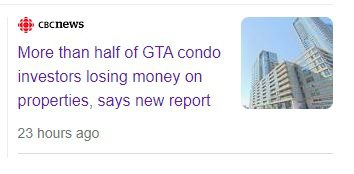
I also saw this headline:
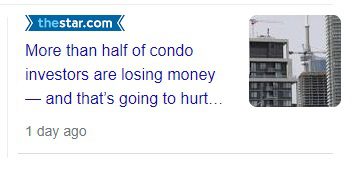
Oh, and this one:
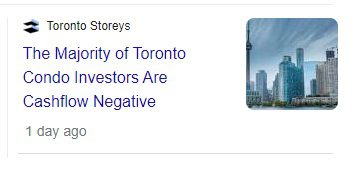
Of course, I also saw this one, from our friends at BlogTO:

And last, but not least, I saw a somewhat original piece of news (because the writers drew a cause-and-effect conclusion) in Bloomberg:
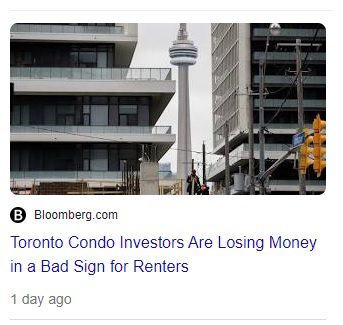
Geez.
Since when did the news become an echo chamber?
It’s like one old lady coughed and the entire news media reported on it.
But this isn’t new information.
The story I just told you was detailing an experience from 2016.
The truth is: it’s been almost impossible to find a cash-flow positive condominium investment, with 20% down, for many, many years.
Shall we work through a current example?
Let me look for a 1-bedroom in LIberty Village….
….ah, here:

This is a somewhat basic 1-bed, den, 1-bath unit, no parking, no locker, in a newer building.
This unit sold one month ago.
Now, what would this unit rent for?
Here’s the same floor plan, also with no locker and no parking:

Let’s work through the math.
A 20% down payment on a $645,000 purchase is $129,000.
On a 5-year, fixed rate mortgage of 4.79% (the prevailing rate today), with a 30-year amortization, the monthly mortgage payment is $2,689.49.
The maintenance fees on this unit are $429.96/month.
The taxes are $2,388.71 per year, or $199.06 per month.
Mortgage + Maintenance + Taxes = $3,318.51
This unit is cash flow negative by $718.51 per month.
That means if you only want to make a down payment of 20%, you’re going to have to feed the property $718.51 out-of-pocket to keep up.
Am I telling people something they don’t know?
I’m somewhat perturbed by these headlines, to be honest.
It’s like seeing a headline today that reads, “Toronto Maple Leafs Have Potential To Be Underachieving And Frustrating In Matthews/Marner/Tavares Years,” which we have actually known for at least a half-decade…
I could give you other examples, just to drive home the point.
Shall we look back at……say…..2019?
Here’s a sale from May of 2019 for a similar 1-bed, 1-bath in Liberty Village:

A 20% down payment on a $550,000 purchase is $110,000.
On a 5-year, fixed rate mortgage of 3.49% (the prevailing rate in 2019), with a 30-year amortization, the monthly mortgage payment is $1,967.18.
The maintenance fees on this unit are $292.03/month.
The taxes are $1,776.69 per year, or $148.01 per month.
Mortgage + Maintenance + Taxes = $2,407.82
And how much did this model lease for in 2019?

A mere $2,150 per month.
This unit is cash flow negative by $257.82 per month.
That was 2019.
I just showed you 2023.
Need I show you other examples to further drive home the point?
Now, many of you might be asking, “David, what do you stand to gain here? Are you trying to tell you that real estate is a bad investment?”
No, of course not.
Real estate is a fantastic investment, not only in terms of forced savings that comes through the principal repayment portion of the mortgage, or in terms of the sky-high rents that landlord benefit from, or the medium and long term appreciation that investors benefit from.
I am, however, trying to point out once again that headlines about real estate are awful right now. They’re just so far removed from reality.
If it’s not BlogTO telling us that the condo market has tanked, as we read in Monday’s blog, it’s five Toronto media outlets reporting on a report that says landlords are losing money on rental properties.
But this article could have been written in 2019. Or 2016.
Since most investors look to purchase with the minimum down payment allowed by law, which is 20%, it seems to reason that “most” investors have been cash flow negative for quite some time.
The headlines, which are all that most people read, aren’t explaining what’s going on in the market.
Since the dawn of time, the measure of cash flow has been with the assumption of a 20% down payment. It’s like the gold standard. It’s like assuming $USD. It’s simply the go-to measure.
So isn’t this old news?
I mean, I guess it’s in how you frame it.
Any property can be cash flow POSITIVE if your down payment is high enough!
If an $800,000 condo only brings in $2,600 per month in rent, and it’s $700/month negative cash flow with a 20% down payment, then just make a 50% down payment, and, voila! You’re cash flowing like a rap star!
But none of this is discussed in the articles and it certainly can’t be assumed.
And some of the headlines are different than the stories themselves.
Some of the articles specify “pre-construction condo investors,” whereas others talk about the overall percentage of investors that are losing money.
But again, what’s “losing money?”
With what down payment?
And with what expenses?
One story references pre-construction condo investors specifically, but there are so many other factors here. Consider the ridiculous prices paid at the onset when compared to resale prices. Then think about the wild closing costs that aren’t present with resale investments. And what about the amount of competition that exists in many new condos upon occupancy (ie. a building that is 90% investor-owned where 150 one-bedroom units flood the market at the same time), or the developer attempting to set (fix?) rents in a new project.
These headlines are like saying “Everybody’s hungry,” but you don’t know how many people are in the room, who just ate lunch, and who hasn’t eaten in a week.
Then there’s the failure to differentiate between “a tight market” for resale condos versus condominium assignments.
Oh, wow.
That’s like comparing the sale of a scoop of ice cream on a hot summer day to the use of a borrowed bucket and ten minutes and with Betty the Cow…



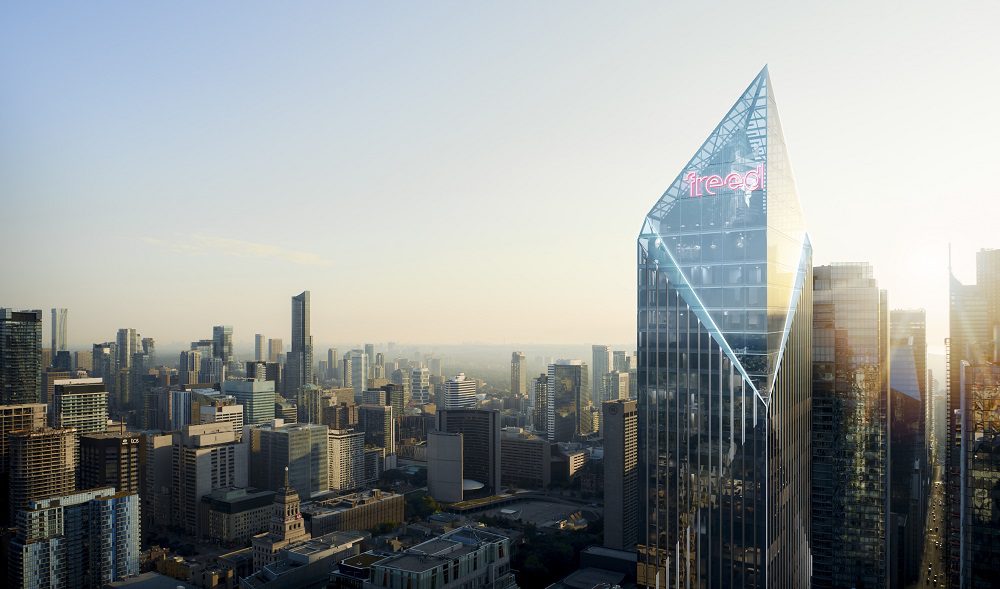




























London Agent
at 7:45 am
How can I use the given information to suss out the NHL player…
David Fleming
at 9:28 am
@ London Agent
Absolute Leaf killer…
Libertarian
at 10:51 am
The player and his dad were not from the GTA but they bought a downtown Toronto condo. Why? Was the player drafted by Toronto and subsequently traded?
Nathan
at 1:43 pm
Well currently there are only 30 Canadian players in the NHL that are 27 years old. Even less that are from Ontario and signed a contract one year ago.
Jared McCann or Andrew Mangiapane fit the descirption, but since David added Leaf killer, my guess is Carter Verhaeghe
Island Home Owner
at 2:37 pm
It’s definitely Verhaeghe!
Libertarian
at 3:06 pm
According to NHL.com, Verhaeghe was born in and drafted by Toronto. Makes total sense now.
LucasJ
at 4:08 pm
I’m going with Sam Bennett, given what he did to Knies!
m m
at 10:10 am
I remember reading a lot about the benefits of a cap rate. David posted here about it a few years ago. It should still apply, but it’s not being talked about much any more. My experience has only been with a cash flow positive scenario, and I would still prefer that in the future.
Appraiser
at 11:22 am
Housing Crisis. And yet according to Statistics Canada GDP report today:
“Coinciding with higher borrowing costs and slowing mortgage borrowing, housing investment fell 3.9% in the first quarter of 2023, the fourth consecutive quarterly decrease. The decline in investment was widespread—as new construction (-6.0%), renovations (-2.1%), and ownership transfer costs (-1.5%), which represents resale activity, were all down. The decline in new construction was observed in every province and territory except Yukon.”
https://www150.statcan.gc.ca/n1/daily-quotidien/230531/dq230531a-eng.htm?HPA=1
JL
at 11:52 am
You’re right about negative cash flow being an overstated issue, but I think it will be interesting to see what happens to those places that are in the red even when factoring in principal repayment. By my quick calcs, at current rates that first example is still losing money (albeit something like $60 a month). Easily covered by capital appreciation in the long term, but if the gap widens… There is a point when the math doesn’t work without either rents going up or rates dropping.
RE Investor
at 1:49 pm
Interesting that you are a realtor talking about real estate investments without mentioning cap rates. Using your math, and adding maintenance / repair costs (5% of rent), cap rates were 4.4% in 2016, 3.5% in 2019 and 3.4% in 2023.
In today’s market, when 5-year fixed mortgage rates are at ~5%, and cap rates are at 3.4%, the economics of owning a condo-rental property are deeply challenged with leverage. And without the use of leverage, a 3.4% return (before taxes…. after tax returns are ~2.4% with a 30% tax rate) is even lower than a 5-year fixed GIC at ~5%.
With this math set out, I would agree that investors buying condos at market prices in Toronto (while maybe not cash flow negative) aren’t getting an attractive ROI.
Of course, you can bank your investment return based on property appreciation and rent price increases…. but that is much more speculative in nature.
Ace Goodheart
at 10:00 pm
I always thought condo investing was risky investing.
The buildings get old, and require more maintenance. Special assessments happen. Monthly fees go up. Also older buildings have units that depreciate each year. Everyone wants a new condo.
I preferred purchasing land or buildings in areas that I thought would undergo an increase in density. For example, I purchased a string of old houses on a street in Oshawa (of all places) for very little money, because I thought that, ten years down the road, that street would become very busy (it was more of an educated guess, I kind of knew what the long term plan for the area was).
When I was right, I sold my six old houses to a business consortium that wanted to build a gas station, a muffler shop and a coffee house. I got an eight figure sum for those old dumps. Completely worthless houses. Didn’t matter. The area became the main commercial strip for a bunch of new developments, and could support million dollar retail investments, which is what happened.
I just look at condos and I think the only person getting rich is the developer. And they are doing it gangsta style. Borrow from the bank to buy the land, borrow from the purchasers to get the permits and approvals, purchasers then borrow from their banks to fund the construction, and borrow again for their mortgages. The only person who had no skin in the game was the developer. Borrowed from everyone, walked away a multi millionaire. So gangster!
I look at the individual unit holders and it just looks dodgy to me. How long do you have to wait to actually get any money? The whole time I owned my six houses I had tenants in them. They paid me more per month than my carrying costs, by quite a bit. They left me alone and I left them alone. When I finally sold the land, one of them tried to burn the houses down (which would have been fine with me, the land was worth more without the houses on it). Other than that, no issues. I never paid a dime for any of it. Just my initial down on the six houses (I bought them as an estate sale from some dead old guy’s crazy family).
Whenever I have made money in real estate, it has been by owning actual dirt. Never had any interest in condos. Just too dodgy for me to sleep at night.
stellarhomesdeveloper
at 9:07 am
“Happy reading! As Toronto’s real estate market evolves, finding cash-flow-positive investment properties can be a challenge. This blog provides valuable information and a practical perspective on current market conditions. This is a must-read for anyone considering investing in real estate in Toronto!